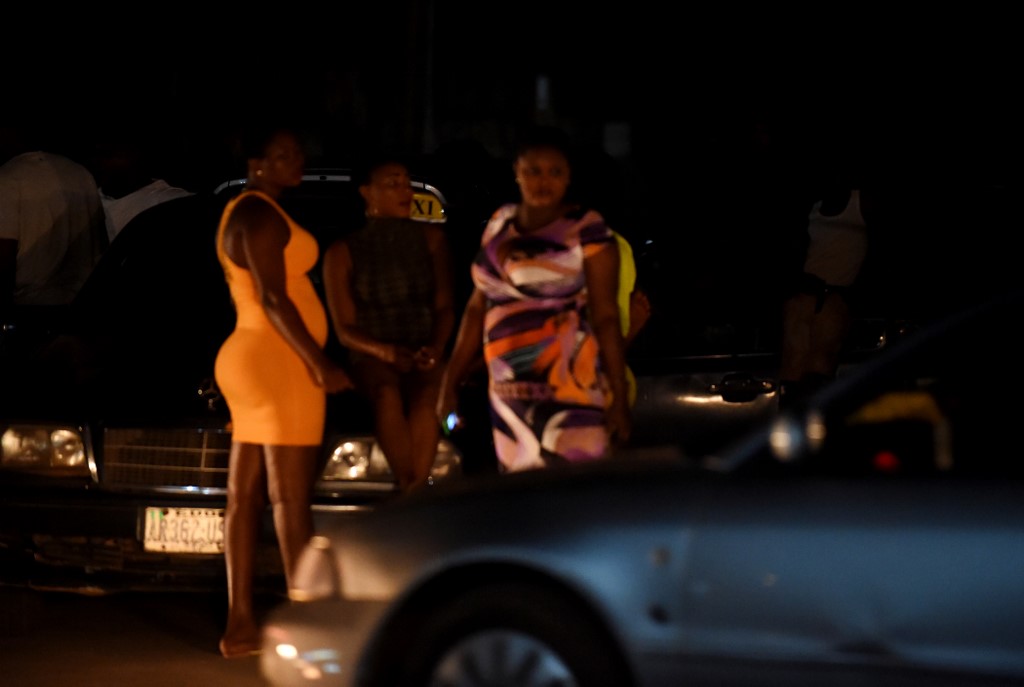
In this file photo taken on March 29, 2017, sex workers stand on the street in Benin City, capital of Edo State, southern Nigeria. On April 17 and 26, 2019, dozens of women were arrested in night clubs, strip-tease clubs, luxury hotels and in the streets of Abuja for prostitution, but many of them strongly deny it. The scandal revived the debate on women’s rights in the Nigerian society. AFP FILE
ABUJA, Nigeria — In Nigeria, being a young woman “is a crime”, said a 25-year-old beautician, arrested two weeks ago while walking home in the capital Abuja.
She says she was detained, assaulted and then raped by those meant to protect her.
“Around 9:30 pm, or 10:00 pm, I was walking back home,” she said. “The police arrested me in the street, accusing me of ‘being out late’.”
The officers demanded she pay 4,000 naira ($11) but she did not have the cash. So the officers grabbed her, she said.
“They took me to the bush behind a building,” she said, her voice cracking with emotion. “There were four of them. They molested me, and while three were holding me down, one of them raped me. He didn’t use a condom.”
Several other women reported similar assaults that night.
Mass arrests
In two dramatic raids last month, dozens of women were dragged out of nightclubs, hotels and bars — or simply taken off the streets — in Abuja.
They were arrested for prostitution, a charge many furiously denied.
The sweeping police crackdown in the federal capital has sparked outrage in the news and on social media in Africa’s most populous nation.
Prostitution, although illegal in Nigeria, is still widespread in the cities and often tolerated in the Christian south, but less so in the Muslim north where sharia law applies in some states.
Abuja — situated slightly north of Nigeria’s centre — is a mix of southern and northern tribes and traditions.
Testimonies from women given to AFP provide shocking stories of multiple and brutal sexual assaults. The women accuse officers from the federal police force.
Sex for freedom
Lawyer and activist Martin Obono happened to be at the Utako police station in Abuja on the night of April 26 for another case.
“I was there when the girls got out of the vehicles, screaming, and some of them were bleeding,” Obono said, adding the women said they had been attacked in the vehicles as they were brought to the police station.
“They told me the policemen used objects, like sticks, to touch their private parts,” Obono said.
One of the women was a mother with a two-month-old baby.
“She wasn’t allowed to breastfeed her, despite continuous crying,” Obono said. “It took the intervention of a female police officer for that.”
One of the women dragged into the station on that Friday was a 22-year-old who had been at a party in a hotel when the police arrived.
“They dragged me out, accusing me of being a prostitute,” she said, explaining how police suddenly arrived in a fleet of pickup trucks. Many of the women were later released — after making forced payments.
“Some of the girls paid bribes,” she said. “Others accepted to have sex with them in exchange for their release.”
‘Making noise’
A spokesman for the Abuja police told AFP he would not be available for comment “until next month”, while multiple other calls and messages to other police officials went unanswered.
However, Abayomi Shogunle, Assistant Commissioner of Police, posted a message this week on social media addressed to “those making noise on the clampdown on prostitutes in Abuja”.
Shogunle made no comment on specifics on the raids, and did not respond to allegations of rape.
But he did say that prostitution was “a crime under the law” and a “lifeline of violent criminals”.
Some of the women have already appeared in court.
On Monday, 27 of the young women were handed one-month suspended prison sentences and fines of 3,000 naira each for prostitution.
Some were sentenced without access to legal representation, said lawyer Jennifer Ogbogu who represented two organisations at the trial — the Nigeria Sex Workers Association and Heartland Alliance International.
“Some were prostitutes, others not, but in no case can this justify their rights being violated,” Ogbogu said.
In an open letter, a coalition of 72 women’s organisations, leading campaigners, civil society and human rights groups, said they “strongly condemn the recent raids, public humiliation, assault and sexual harassment of over 100 women” in Abuja.
They demanded a government investigation.
Nigerian security forces have faced such accusations before.
In October 2017, a court of the Economic Community of West African States, ECOWAS, ordered Nigeria’s government to pay 18 million naira in damages to three women.
The court said the women had been illegally arrested and detained by the same police unit in Abuja accused of carrying out the recent raids.
“They know we are vulnerable, and they don’t treat us as human beings,” said the beautician.
“All this has to end. They should be punished for what they’ve done to us.” /cbb